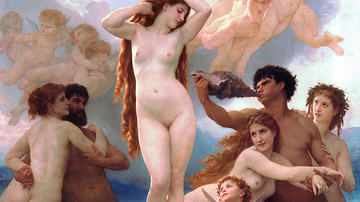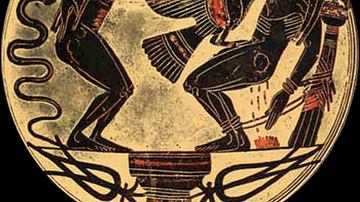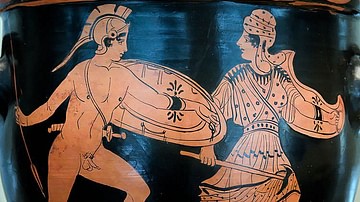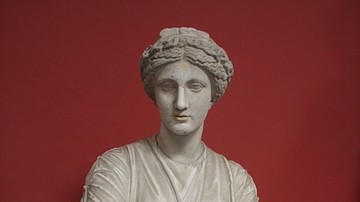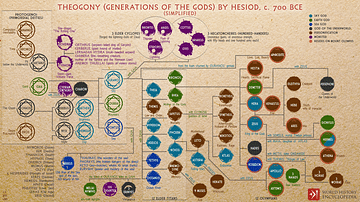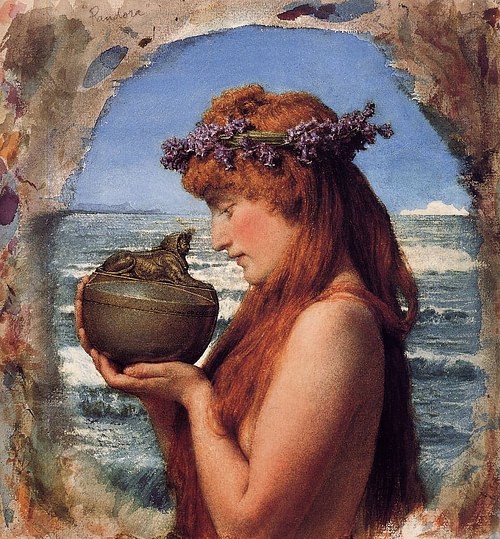
Pandora is a figure from Greek mythology who was not only the first woman, but —as an instrument of the wrath of Zeus— was held responsible for releasing the ills of humanity into the world. Pandora was also an unrelated earth goddess in the early Greek pantheon.
Pandora - an Instrument of Punishment
The name Pandora means "gifts" and "all". According to (and perhaps even invented by) Hesiod in his Theogony and Works & Days, Zeus had Hephaistos make Pandora, the first woman, from earth and water. Zeus' intention was to use the beautiful and lovely Pandora as a means to punish Prometheus who had stolen fire from the gods and given it to mankind, who would in turn be punished. Zeus promises:
Son of Iapetus [Prometheus], you who know counsels beyond all others, you are pleased that you have stolen fire and beguiled my mind – a great grief for you yourself, and for men to come. To them I shall give in exchange for fire an evil in which they may all take pleasure in their spirit, embracing their own evil. (Works & Days, 54-59)
Pandora's Divine Gifts
Before her departure, Pandora was given a range of divine gifts by each of the Olympian gods. Athena taught her all the fine crafts and dressed her in silvery robes, Aphrodite gave her grace and the means to create burning desire, and Hermes gave her "a dog's mind and a thievish character" and in her breast "set lies and guileful words" (Works & Days, 67-68, 77-78). If that was not enough, she was adorned with fine jewellery by the Graces, crowned with a magnificent golden headband made by Hephaistos, and given garlands of spring flowers by the Seasons. Finally, Pandora was given a large storage jar to take down to earth which she was told she must never open under any circumstances.
Pandora's Box: The Evils of the World
Pandora, guided by Hermes, was sent to Epimetheus, the brother of Prometheus. Foolishly forgetting his brother's advice never to accept a gift from the gods, the beautiful Pandora was made welcome in Epimetheus' home and the two married, having a daughter, Pyrrha. One day, and fulfilling her destiny, curiosity got the better of Pandora and she lifted the lid of the storage jar which released all the evils of the world. These terrible things included disease, war, vice, toil, and the necessity to work for sustenance.
Pandora, realising her mistake, quickly replaced the lid but it was too late and only one thing remained inside, caught in the edge of the jar's lip —Hope— so that humanity might somehow bear its sudden and eternal misfortune.
"Hope" is the traditional translation from the Greek but actually may be better represented by "anticipation" which includes an expectation of both good and bad events. Through this punishment Zeus thus compensated for the theft of fire and restored the eternal division between gods and humans.
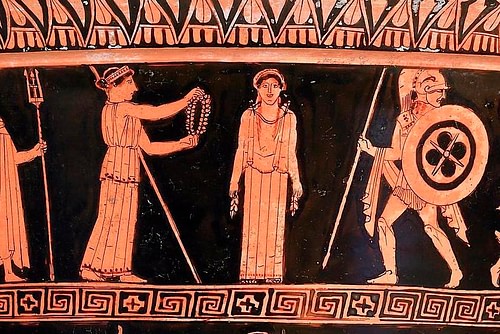
Pandora in Art
A relief frieze showing the birth of Pandora appeared on the statue base of the gigantic Athena Parthenos by Pheidias which stood inside the Parthenon. According to Pliny the scene included 20 gods looking on. Pandora appears too on a few Attic vases in scenes probably inspired by the now lost satyr play Pandora by Sophocles.
In one 5th century BCE red-figure krater, now in the Ashmolean Museum Oxford, Pandora emerges from the ground, symbolizing her origin from clay. In such scenes either Epimetheus or satyrs hold mallets but the significance of these has, unfortunately, been lost and they once more illustrate the richness of Greek mythology beyond the surviving literary sources.
